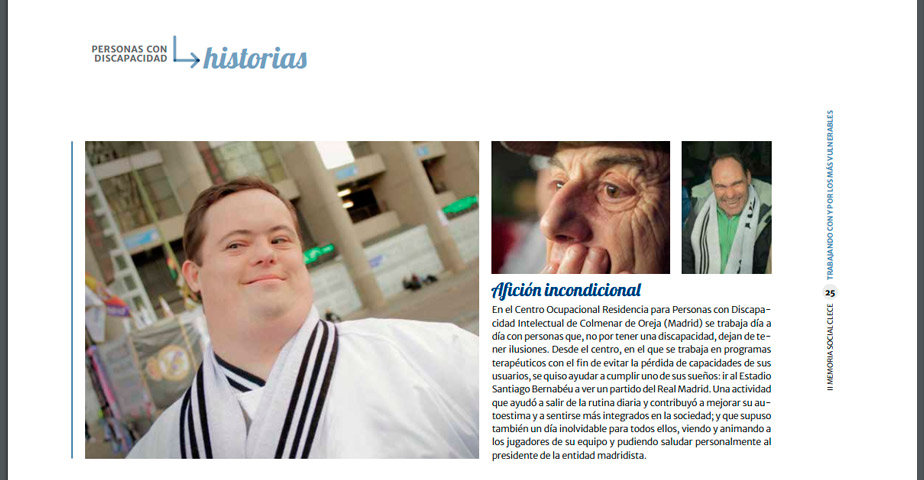
II Clece Social Report
- Social commitment told through personal testimonies
November 2015. Clece has just published the second edition of its Social Report, giving a full account of its social project, with the emphasis on success stories and personal testimonies from some of its beneficiaries.
Divided into four areas of action – Employability, Integration, Raising Awareness and Caring for People, Clece’s social commitment is based on initiatives aimed at providing direct and indirect benefits for different groups of people, particularly those who are most vulnerable, such as people with disabilities, victims of gender-based violence, people at risk of social exclusion, victims of terrorism and young people who are out of work.
In terms of Employability, the aim of Clece is to help people find their place on the job market, and to strengthen the professional and personal development of the company’s employees. With a workforce of 71,429 employees and growth of four thousand jobs a year, Clece is “the third-largest private firm in Spain by size of workforce”, as explained by the Clece chairman, Cristóbal Valderas. This is a great team not just in terms of numbers, but more importantly in terms of human quality and social awareness. These are values that we pour into our work and which have made it possible for our social project to evolve to such an extent in such a relatively short time.”
A company of integration
In terms of integration, 6,256 members of staff at Clece come from disadvantaged social groups, making up 8.7 per cent of the workforce. Specifically, 4,636 of these are people with disabilities, 937 are young people who were unemployed, 501 are people at risk of social exclusion, 178 are women who have endured gender-based violence, and four are victims of terrorism. To achieve integration in this way, Clece collaborates with more than 200 associations, foundations, social entities and public bodies, as a source of selection and recruitment for people from disadvantaged social groups.
“The figures are very encouraging,” says Cristóbal Valderas. “Especially if you know the real stories, stories with names and surnames, that are behind these numbers: people in precarious or particularly vulnerable situations who find a way out through their work. It is precisely because of this that we have given voice to these people in our social report, so they can talk first hand of our commitment.”
Commitment Awards and Forums for Integration
Clece seeks not only to provide job opportunities for people from disadvantaged social groups, but also to promote, organise and sponsor actions to draw attention to their situations. The aim is to raise awareness in society of the reality and situation that these people are going through and get businesses, organisations and public administration involved.
One of the most prominent awareness-raising initiative is the Commitment Awards. With the aim of supporting the work of social entities and not-for-profit organisations, Clece has created and organised these awards, which recognise the best regional projects in areas such as providing elderly people with the assistance they need, and helping people with disabilities, women who have suffered gender-based violence and people at risk of social exclusion find work.
Another major landmark was the launch of the website www.clecesocial.es, which includes real stories and testimonies relating to Clece’s social commitment. The 2nd Forum-Colloquium, entitled “Clece for Integration”, was held in Valencia and focused on women who have suffered gender-based violence.
Caring for people
Clece carries out various social activities that go beyond just providing the service contracted with a particular public administration. The aim is to improve the quality of life of users by helping with their social development and integration. Clece is heavily involved in organising intergenerational meetings or days spent with relatives, research and development of innovative therapies and wellbeing treatments, integration initiatives such as leisure and cultural activities with elderly people, and socially committed actions such as campaigns to collect clothing and toys to help disadvantaged children.
The second social report also includes the company’s involvement in addressing environmental concerns, such as measures to reduce its own energy consumption levels and those of others, and raising awareness of the importance of caring for the environment.
